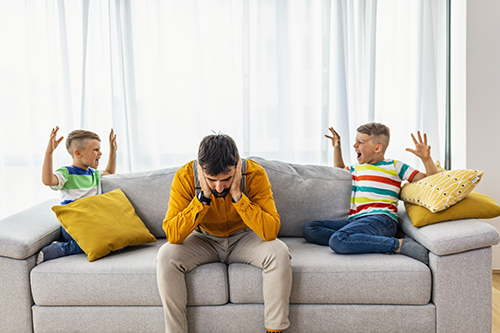It may be hard to believe, but it’s now September, which means- schools are kicking off another school year. But 2020 is anything but “normal” and the school year may be as unprecedented as the times we are currently living in. Each school district has released information on their plan to re-open, and what the “new normal” school year will look like. To some, this may look like online learning, while to others, it may look like a hybrid-learning module between in-person and online learning. Regardless of how this school year will look for your little one, both options have the possibility of the same outcome: stressed parents just wanting their kids to succeed. –
The Pew Research Center found that since the beginning of the COVID-19 pandemic, “91 percent of adults have reported that their lives have changed at least somewhat, while 44 percent said their lives have changed in major ways.” Many parents have experienced some drastic changes this year alone, from having to work from home full-time, to becoming a full-time teacher and caregiver to their children. The endless at-home job duties, combined with the low levels of social support, and a lack of leisure time can be associated with an increased risk of experiencing parental burnout.
What Is “Parental Burnout?”
For a long time, the term has somewhat held a stigma that most parents have not been able to identify in their lives, because it has been down-played for generations. Parental burnout “is an exhaustion syndrome, characterized by feeling overwhelmed, physical and emotional exhaustion, emotional distancing from one’s children, and a sense of being an ineffective parent (Psychology Today).” Even with schools, pre-schools, and childcare centers reopening, many parents are afraid and anxious about sending their children back into these environments because of the potential risk of contracting COVID-19. However, having them at home 24-hours-a-day, for seven days a week certainly has the potential of increasing stress levels for both parent and child.
What Are Some Signs To Look For?
We’ve broken down a few telltale signs parents can exhibit if they are experiencing exhaustion.; however, they should always go to their primary care provider to be officially diagnosed.
Mild Burnout – Short temper and/or limited tolerance, foggy-brain, heightened sensitivity to their emotions and environments, and disruptions in sleep patterns.
Moderate Burnout – Same symptoms as mild burnout accompanied by headaches, confusion, forgetfulness, upset stomach, anxiety/depression, feeling of isolation and/or overwhelmed.
Severe Burnout – Long-term exhaustion, stress, lack of physical/emotional/logistical support, and physical/mental health complications.
Tips To Combat Parental Burnout:
- Be a “good enough” parent – You don’t have to be a flawless, perfect parent to your children. What does perfect even mean? It’s relative! So, cut yourself some slack and balance the needs of your children, while still caring for yourself.
- Ask for help – Reach out to family members (parents, sisters, brothers) or spouse to help you juggle taking care of the children, being a teacher for them, and give you a hand to allow you to still be able to work.
- Practice self-compassion – If you are patient and empathetic towards others, then it’s time to start practicing those same characteristics towards yourself. Allow yourself to seek help and receive the help you need.
- Reach out for support — Remember you are not alone in experiencing parental burnout (or feeling stressed during this unprecedented situation). Find a support group of parents who are experiencing or have experienced parental burnout, and who are also learning the ways to be a professional, a parent, and a teacher during the COVID-19 era.







